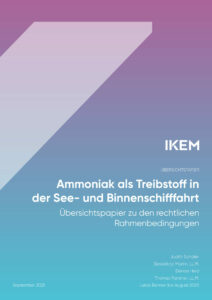In a paper and issue brief released today, IKEM analyses the shore-side framework for the use of ammonia as a marine fuel and the prerequisites for the approval of ammonia-powered inland vessels. Die Autor:innen decken darin nicht nur Rechtsunsicherheiten und -lücken auf, sondern haben auch Handlungsempfehlungen erarbeitet, damit die klimaneutrale Kraftstoffversorgung der Binnen- und Seeschifffahrt Realität werden kann.
‘In the shipping industry, the transition to climate-neutral fuels and propulsion systems is becoming an increasingly important topic. Ammonia that is synthesised from renewable energies can play a significant role in decarbonising shipping in the future,’ said Thomas Paintner, who co-authored the study. ‘But for ammonia to be used in shipping, a number of things still need to change, including the legal framework and the technical infrastructure in the ports.’
‘The current legal framework primarily reflects the use of ammonia in the fertiliser industry. Clear legal frameworks are needed for the bunkering and delivery of ammonia as marine fuel. Otherwise, there won’t be widespread use of this new technology,’ said Judith Schäfer, the head of IKEM’s Energy Law Department of Energy Law and a co-author of the study.
In the paper, the authors recommend the following measures:
- Regulate and harmonise the licensing requirements and procedure for bunkering permits
- Specify fuel quality requirements in the 10th BImSchV
- Extend the exemption to levy requirements granted to some fuels under the ChemVerbotsV so that this also applies to ammonia fuel
- Include regulations on the construction and operation of ammonia bunkering stations in concession agreements for port areas
- Regulate technical requirements for inland waterway vessels with an ammonia-fuelled internal combustion engine
IKEM prepared the study and brief as part of the CAMPFIRE consortium project, which aims to develop new processes for the decentralised production of ammonia from locally generated wind and solar power. IKEM is responsible for the accompanying legal research on topics including the use of ammonia as an energy source for emission-free shipping.






